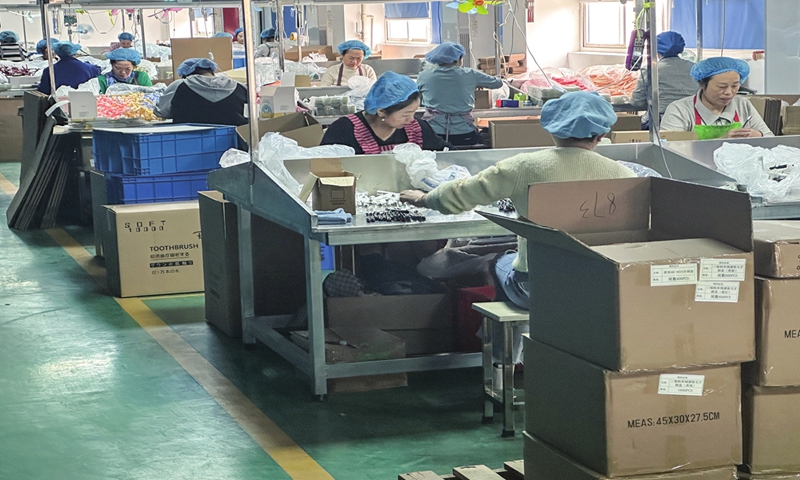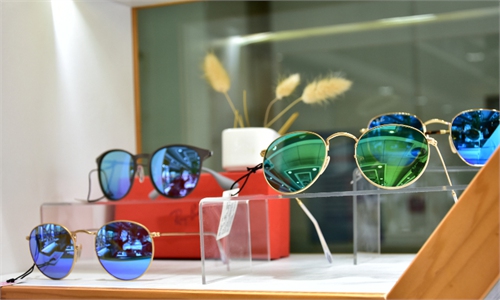Intelligent manufacturing, industrial upgrades empower Hangji’s toothbrush industry
Smart manufacturing, constant technology upgrades give small town a facelift

Photo: VCG
Hangji, a small town in Yangzhou, East China's Jiangsu Province, known as "the toothbrush capital of China" and "Chinese city of hotel amenities," is sparing no efforts in upgrading the traditional labor-intensive manufacturing industry into technology-driven and high-end branding, in an effort to maintain its leading position in the world's industrial chain.
Toothbrush manufacturing has been a tradition for Hangji and the industry started to flourish since China's reform and opening-up in late 1970s when a good number of private home-based manufacturing workshops mushroomed in the town.
Currently, there are a total of 4,000 toothbrush firms in the town, among which 82 are of large scale, and about 25 companies have annual sales of more than 100 million yuan ($14.6 million).
"The annual toothbrush output of Hangji is 7.5 billion. They are exported to more than 80 countries and regions in the world, accounting for 60 percent of domestic toothbrush market and 40 percent of the international market share," Leng Chuanchun, secretary of the Toothbrush Industry Association of Jiangsu Province, told the Global Times on Wednesday.
With its yearly toothbrush output value worth more than 13 billion yuan, Hangji, having a population of about 30,000, achieved per capita GDP higher than Shenzhen's, a developed technology hub in Guangdong Province.
"Multinationals and listed firms have rooted for the small town during the past decades by doubling down on their investment here, bringing capital and advanced equipment, helping to boost the comprehensiveness and competence of local industrial chain," Leng said.
Colgate Palmolive, an American multinational engaged in the manufacturing of toothbrush, toothpaste and other personal care products teamed up with Hangji's local toothbrush firm Sanxiao in 2000 in establishing a joint venture company. Since 2003, the JV has become a wholly foreign-owned enterprise.
Booming orders
The toothbrush industry, propelled by the rise of the middle-class consumers in the world that are paying more attention to their dental hygiene, is rejuvenating in the small town as the COVID-19 pandemic prevention measures eased across the country. Businesses are witnessing their orders returning in volumes.
Tu Xinning, head of Jiangsu Keshiduo Daily Necessities Co in Hangji, told the Global Times on Tuesday that the company has received a surge in orders for toothbrushes since the start of this year with the value of orders reaching 20-30 million yuan now.
Tu is a big family name for local toothbrush making industry. The town's first toothbrush plant - Shuguang Toothbrush Factory - was established by Tu's family in 1976.
"Our current orders have arranged for the three months to come, and major clients are from the Southeast Asia, the Middle East and Latin America," Tu said.
"The COVID-19 pandemic has made consumers renew their awareness of oral care. They are now willing to change their toothbrushes more often than before," he said.
The backlog of orders due to the pandemic began to be delivered in batches. Coupled with multiple beneficial factors such as the recovery of tourism in Southeast Asia where hotel business is now recovering, the global demand for toothbrushes and hotel amenities has grown steadily, he added.
There are more than 4,000 companies in Hangji that are engaged in producing hotel products, supplying for nearly 500,000 hotels around the world, according to Leng.
The Middle East has always been the most stable and potential customer of Hangji. In 2021, Hangji's foreign trade exports to the Middle East accounted for 21.3 percent, an
increase of 12.6 percent year-on-year, local data showed.

A view of Jiangsu Keshiduo Daily Necessities Co's manufacturing facility in Hangji on April 12 Photo: Courtesy of Jiangsu Keshiduo Daily Necessities Co
Focusing on quality
With China's efforts for attaining high-quality economic development set for the next five years, industrial upgrade is no longer a slogan for companies as the golden age of product homogeneity and high-speed growth relying on low-cost production has passed.
For Hangji, which is greatly dependent on the toothbrush manufacturing, a consensus has been reached in the business circle: Without transformation and upgrades, there is no easy way out.
"Like most toothbrush makers in the town, we are focused on technology upgrade," Tu said.
His company has realized the full automation of toothbrush manufacturing thanks to the introduction of advanced equipment from Germany. The five automated packaging lines could help increase the daily output of toothbrushes to 350,000 and more from previous 25,000 per day.
Another example can be demonstrated by Shuguang Toothbrush Factory, which developed a brand-new environmentally friendly toothbrush made of straw material left over from natural sugar canes. It can achieve 100 percent decomposition.
The technology enabled Shuguang to successfully enter the dental clinic market in Germany, Sweden and other developed countries, enabling it to climb the ladder of global value chains.
For Tu, intelligent manufacturing is not enough. He is eyeing for well-known branding.
"Our company is making preparations for a slew of exhibitions in overseas markets such as Japan and the UK in the coming months where we want to promote our own brand that is made in China," Tu said.
Gradually tearing off the traditional label as original equipment manufacturers (OEMs), Chinese firms have come to realize the importance of branding. "Now 70-80 percent toothbrushes we sell are of our own brand for the overseas markets which are increasingly welcomed abroad," Tu said.


